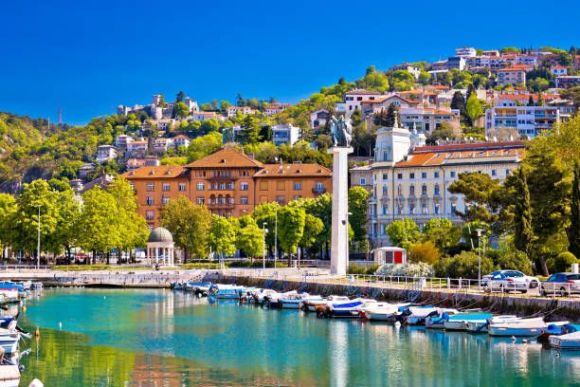
Rijeka, Croatia. Picture: Creative Commons.
Every city in the European Union is an individual and special place facing its own problems and challenges. Wanting to explore novel approaches to sustainable development, inclusivity and beauty, certain cities have gained the opportunity to be a part of the EU-funded Re-Valeu project. Through collaboration of urban design and planning, this project is focusing on helping the cities of Rijeka (Croatia), Pisek (Czechia) and Bruges (Belgium) overcome challenges that the urban transition is manifesting. As experimentation is the key word in this kind of undertaking, all of the city participants have stumbled on some kind of problem or setback.
Journey to Change, a European Week of Regions and Cities session, has been covering the situations that made urban transition of those cities slower and more complicated, as well as the solutions and further plans of development. The concept of the session was well planned, making all participants get involved in solving each city problem after it’s been presented to them by the speakers. The participants, who were mostly members of Public Administrations all over Europe, presented their own ways of dealing with similar problems in their own municipality, giving suggestions and objections on the topic that every city speaker presented.
The Croatian city of Rijeka wants to redevelop its waterfront and attract people closer to the sea. However, jurisdiction problems with the state controlling part of the coast has made an unbalance in marina investment. Having abandoned industrial complexes from the last century and a highly polluted sea area, Rijeka needs to find a way not only to a new, redesigned waterfront, but also to the new perception citizens will have of that part of the city, making it more attractive and vibrant. The Czech municipality of Pisek, on the other hand, has found itself in a struggle with the government IT department. The digitalization and modernization of the city is facing security problems, lack of innovations and savings, all of which are unnecessary setbacks. Belgian Brugeshas one of the most beautiful hidden treasures in Europe, salt lakes which they want to repurpose and rearrange in the city atelier has only one permit officer. Additionally, a lack of communication between developers of the city atelier and the municipal administration, has made their relationship a bit uncomfortable.
Listening to all those problems the participants of the session were tasked to find an optimal solution for every of these three specific and different problems, after which the presenters showed their own solutions for the given complications. Rijeka, for example, formed an urban committee, and involved students and their ideas into waterfront planning. The city decided that it would be for the best if some kind of temporary activity like festivals or events were combined into a huge project, like making a kitting area In Pisek, the current city authority is making inner city municipals familiar with the new technology, also parallely building their own system of functioning. Finally, Bruges hired new developers and involved consultants, improved the soft skills of the employers and coached a new technique of working, like conducting live meetings and having frequent feedback from municipal authorities.
The Re-Valeu project really did push boundaries of every city and their plans, making them more flexible and ready for the new challenges ahead. As every urban area is individual, every one of them needs a different approach to different situations. This makes for a more vibrant and diverse Europe based upon inclusivity and sustainability.
By Tibor Sudec



